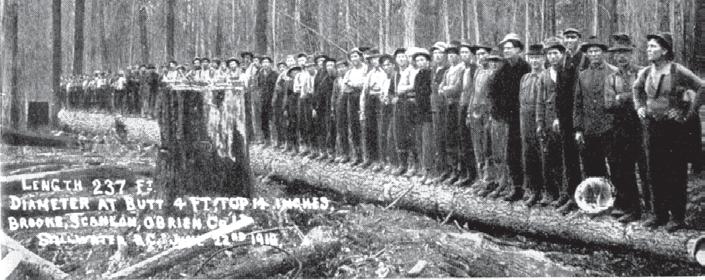
1 minute read
BLAST FROM THE PAST Magnificent Stillwater logs in London’s Kew Gardens, Vancouver Court House
BY JOËLLE SÉVIGNY
“I was king of Eagle River, king of dancing Lois River, Of its falls and tumbling rapids, of its lakes and pools and reaches. Whimsical and full of fancies, like a woman, Lois River, Moody, playful, sullen, sparkling….”
Advertisement
These harmonious words written from the eyes of a rainbow trout, are the beginning of a poem by O. J. Stevenson in the September 1930 Digester, dedicated to the beautiful Eagle River, located south of town.
This area was being logged as early as the 1890s by Farquhar McRae who focused on the lumber close to the shorelines of Stillwater. It was also developed early on as a logging camp in the Brooks, Scanlon & O’Brien logging operations, as early as 1908.
Stillwater was previously named Scow Bay, because of the scows (a flat-bottomed boat) that brought in supplies for the B.C. Mill, Timber and Trading Company from 1890 to 1899. After 1908, the area was referred to as Stillwater, named after the town of Stillwater in Minnesota, which was the hometown of Brooks and Scanlon.
It is said that some of the finest lumber in British-Columbia came from the Stillwater operations and the Lois Lake area. The Kew Gardens, which are the Royal Botanic Gardens in England, at one point hosted a 214-foot-tall Douglas fir flagpole, “The Stillwater Giant,” cut in 1918. Other flagpoles from Stillwater were sent to be erected at the University of British Columbia and the Vancouver Court House (these were eventually replaced or moved).

“WHIMSICAL AND FULL OF FANCIES”: Since at least the 1890s, the area around Stillwater has been both logged and celebrated for its bounty and beauty. Top left, men atop the 1918 flagpole sent to the British Royal Family. Above left, the Copenhagen Canyon Bridge in 1908. Above , the Digester promotes Eagle River – still a sweet swimming spot.
A hotel was also built in 1910 at Stillwater; the Gordon Pasha Hotel contained a store, a pool hall, a restaurant and a post office.
The hotel especially became alive on Saturday nights with loggers enjoying music, dancing and card playing!
Some may recall that the Gordon Pasha Lakes, from which the hotel drew its name, consisted of three lakes which became Khartoum and Lois when Lois Lake was dammed in 1930 by the Powell River Company.
Blast from the Past is a monthly historical column written by the Townsite Heritage Society’s coordinator Joëlle Sévigny. The THS tells the history of Townsite from 1907 onward.




